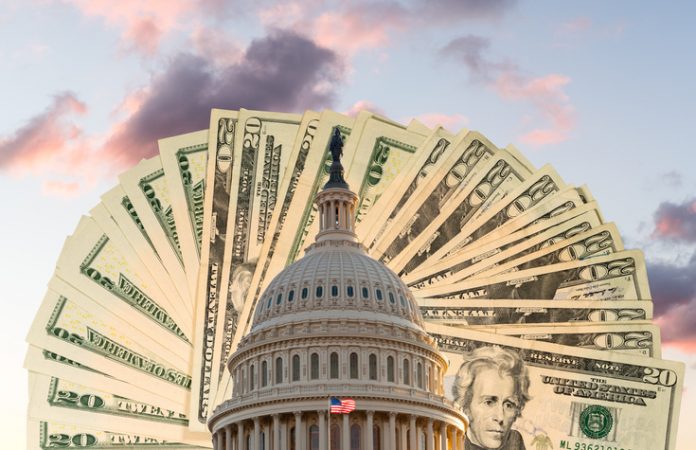Congress has made it difficult for states to resist expansion of their Medicaid programs to cover able-bodied adults, a move that can be politically popular but fiscally risky.
“The big argument in the states is, ‘This is free money from the feds. Let’s grab it. It makes our budget look better, and we’ll be providing health care to relatively low-income people,’” said Dean Clancy, a senior health policy fellow at Americans for Prosperity (AFP).
The expansion of Medicaid, the federal entitlement that already covers 80 million Americans, about a quarter of the nation’s population, has become a key partisan battle in statehouses across the United States. Medicaid expansion is also a hot issue in federal politics, appearing as a central focus of the 2020 U.S. Senate races in Georgia and of President Joe Biden’s campaign.
So far, proponents of limited government have been losing the battle.
Federal Money Almost Free
In Missouri, Republicans long tried to resist Medicaid expansion, but voters enacted a ballot measure in 2020 expanding the state’s program. The state tried resisting after the vote, arguing the ballot initiative did not authorize the legislature to bankrupt the state. In August 2021, a county circuit court ordered the state to implement the program. The Missouri Supreme Court had overruled the court’s initial decision, which had sided with the state.
Missouri is the latest state to adopt Medicaid expansion, which extends benefits to adults between 100 percent and 138 percent of the federally defined poverty level.
By the end of 2021, 38 of the 50 states had chosen to expand Medicaid
“Even states that have held out strongly, like North Carolina, Mississippi, and until recently Missouri, they feel the temptation,” said Clancy. “There’s a gravitational pull there, because when the feds are paying 90 cents on the dollar, it just seems like, why wouldn’t you take that deal?”
State Taxpayers on the Hook
In 2014, the federal government covered 100 percent of the expansion cost, a higher rate than for traditional Medicaid. The 100 percent match was the “carrot” because the U.S. Supreme Court struck down Obamacare’s original language making state expansion an order, not a choice, as an unconstitutional attempt to coerce the states.
The 100 percent match was slowly reduced beginning in 2017, falling to its current 90 percent in 2020.
“It’s been a difficult fight,” said Clancy. “We’ve had some wins. Long-term, it’s hard to see how we prevail.”
Drawbacks of Expansion
States have often underestimated the number of enrollees and have gotten stuck with big bills. Scaling back programs can be difficult. There is also the risk the federal government will pay less than the promised matching rate in years to come.
Expansion contradicts the purpose of Medicaid, says Matt Dean, a senior health policy fellow at The Heartland Institute, which co-publishes Health Care News, and a former Minnesota state legislator.
“Medicaid was designed to serve the very poor, the very sick, and those with disabilities,” said Dean.
Crowding Out Private Insurance
Expansion can also cause “crowding out,” in which people leave the private insurance market once is easier to qualify for coverage they don’t pay for directly.
In addition, employers are less inclined to cover workers who qualify for care under Medicaid, says Dean.
That hurts all workers, Dean says, because when Medicaid costs begin to soar, government programs “pay hospitals below the cost of care, which forces more cost-shifting to a smaller and sicker pool of private health care insurance payers.”
Community Care Alternative
There are alternatives to expanding Medicaid that could provide better care and more cost savings, says Dean. These include “expanding private insurance offerings to increase access, offering a voucher to private-care Medicaid patients, and offering creative hospital-based care for urban areas.”
A reform for hospital-based care would be a community care delivery system (CCDS), says Dean.
“CCDS gives money to hospitals and lets them decide how to provide care to attributed Medicaid patients,” said Dean. “This gives skin in the game to the hospitals and rewards them for lowering total cost of care.”
CCDS was successfully tried in the Twin Cities, says Dean.
“Hospital readmissions were drastically reduced, care was coordinated by nurse managers across the three systems, and the outcomes improved through better coordination of care,” said Dean.
Personal Option
AFP has proposed a list of ideas for improving affordability, quality, and access to health care it calls the Personal Option. These include association health plans, health savings accounts, cross-state care options, telehealth, and streamlining the drug approval process.
The Personal Option website states Americans deserve “good insurance at an affordable price, access to the latest life-saving drugs at a reasonable price, to see a doctor of our choice, conveniently and affordably, to know how much our care will cost, upfront, before we pay for it, the choice to try experimental treatments, and safety nets that protect the vulnerable.”
The website explains ways the public can take action toward these reforms.
Competitive, Consumer-Driven Options
Medicaid is “the worst insurance policy in America,” said Clancy.
The government can never deliver the choice, quality, and affordability Americans need, says Clancy.
“Only competitive markets and consumer-driven innovation can deliver consistently high-quality, affordable health care,” said Clancy.
Harry Painter (harry@harrypainter.com, @TheHarryPainter) writes from Tulsa, Oklahoma.
Internet Info
“What Does the Personal Option in Health Care Mean, Exactly?” Americans for Prosperity, November 12, 2021: https://americansforprosperity.org/what-is-the-personal-option/





















